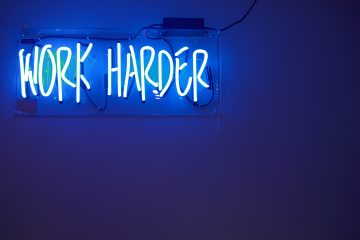You strive to get more from your day. You go to bed full of good intentions for the next day, to be productive, to deliver more than you did today. To achieve more than before, to be a high(er) performer.
The morning starts well you wake up (fairly) fresh, ready to go. Eat well, drink your coffee and settle down to hit the big rocks in your to-do list…
Hours pass by and you stop to reflect on what has been achieved so far in the day. Disappointment fills you as you realise that only a few of the important action items have been completed and actually most of your morning has been bouncing around from call to email, leading to a real lack of productivity. Anyway its lunchtime now so chance to refuel and reboot and make up for this in the afternoon.

Post lunch though you feel a little sluggish, you didn’t really take the time to hone the action list to be focused on the must deliver items, and you keep getting distracted by various members of the team. The day draws to a close and on reflection, you got through a few calls and meetings, maybe even ticked off a few of those actions but that feeling of… I could have done more, I could have been more productive can’t be shaken off. You head home determined to have a better performance tomorrow.
For many people, the realisation that they aren’t achieving their peak performance on a consistent basis is quite stark and the desire to improve is genuine, however taking the right actions and setting themselves up for delivering that high-performance day in, day out seems far away.
There is no secret, there is no magic bullet. The self-analysis and drive must be there, it must come from the individual in the first place. There are however a few simple steps anyone can take to make those all-important marginal improvements and to give themselves a better chance of hitting peak performance. This is where you can start…
Diet and Sleep: Sorry I know, but it’s true. Eat and sleep well to ensure your body and mind can function at the highest level. A healthy diet and the requisite 8 hours sleep will enable you to function at your highest level by maintaining your energy levels through the day.
Plan and Prepare: Again no secret here but those who consistently outperform their peers take the time to plan their weeks and days. They hone in on the key actions and behaviours that have the greatest impact on their day. They are mindful of the choices to make and those choices are easier because they have already prepared to make them. Write a list and deal with the big rocks first.
Set your environment: Distractions are part of modern-day life, email, phone calls, social media, meetings. Whatever the distraction you need to plan your environment to minimise them. If that means finding a quiet corner of the office or dedicating time away from the office in a library or coffee shop. It might be turning off notifications on your email or placing your phone in the drawer out of sight and out of mind.

Create a Routine: It’s impossible to remove all distractions from your working day so whilst minimising them can help you need to build a routine for your day which is consistent. Finding a solid routine creates a process from which you can fall back on. Process allows your subconscious mind to take over and expend less energy on the minutia.
Set a positive but realistic intentions: You need to have a positive outlook on the day as it starts but expect setbacks and challenges part of your planning a preparation should be about being ready to deal with issues that crop up. Also, don’t be unrealistic with the amount of objectives you set yourself on a daily basis. We often overestimate what can be achieved in the short term. When we set overly ambitious goals and fail to meet them we subconsciously erode our resilience (Read Grit by Angela Duckworth for more on this), and make it more likely that we will give up on forming our good habits and behaviours. Setting ourselves smaller daily targets and achieving them actually builds our “grit” and allows us to develop these daily behaviours.
So there is no secret and there are many other ways of helping you build in the traits of high performers into your daily work routine but as building on point 5, start by taking just one or two of these ideas and building into your routine for 7 days. Once you’ve bedded them into being daily habits, build in another one. Bit by bit you will change your routine and step your performance on.


0 Comments